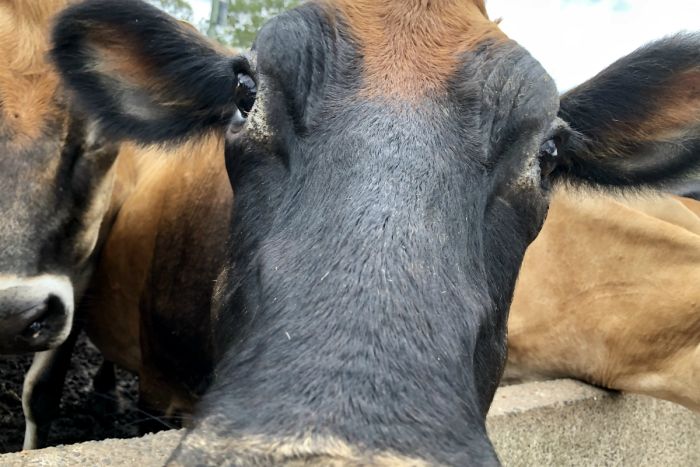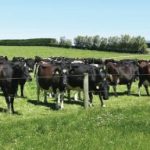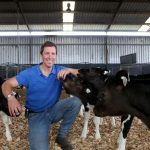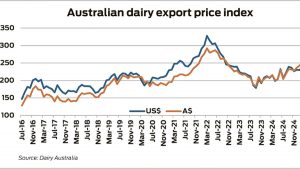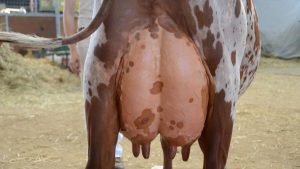
“We’re not as bad as what some of these animal liberationists all think, ‘You know we’re mean and evil,’ well that’s not the case,” Shane Paulger said, as visitors watched his wife Karen bring the cows into the milking bails.
“For too long we [farmers] have taken for granted that the consumer understands us, and they do feel for us a lot of time with drought and floods and fires and so on,” he said.
“But the part that we’re trying to play now is educating people where their milk, in particular, comes from.”
About 450 cows are milked twice daily in the peak autumn season at Adadale Jersey and Holsteins, near Kenilworth, in the Sunshine Coast hinterland.
Up to 2.5 million litres of milk are produced during the season on the 235-hectare property.
The Paulger family’s care for their animals goes the extra distance, evidenced by their care for Jess, a blind Jersey cow.
“Jess is special, she just has so much character,” farm worker Liam Kirk said.
The former city slicker, who left Brisbane to take on a job at the dairy farm, called out Jess’s name to make sure she took her place with the other pregnant cows at feeding time in the top paddock.
Blind from birth
The five-year-old cow navigates dams, fences and trees with ease, following her mates through paddocks.
“We introduced a bull from Canada through semen many years ago, unbeknownst to us that he bred a lot of blind animals across the world,” Mr Paulger said.
“We being softies with our animals, we just didn’t have the heart to put her down and believe me she survives very well.
“She is truly amazing, we had the vets look at her and she’s got slight, might be 2 or 3 per cent vision, might see a slight image or something up ahead because she sort of suspects that there’s something coming up and she’ll stop before she walks into it.
“She’s not in any pain or anything, she’s having a great life, she’s up there munching away on her hay and feed and she just seems to wander around and enjoy life.”
Mr Paulger shared the story of how his parents, Stan and Maureen, built the Jersey and Holstein farm up from humble beginnings to an award-winning dairy that continued to win prizes at state and national shows.
“They drove 36 cows down the road from Woli Mountain and brought them into this property and developed what is one of the most picturesque and productive dairy farms in Queensland,” Mr Paulger said.
“We’re very proud of our achievements — we’ve got wonderful cows.”
Guests learn that the gestation period for a pregnant cow is about the same as for a human, and that the cows are fed a special diet of salts to build up their calcium reserves.
“My father and myself and my family have been very stringent and strict on stud and type with tremendous success in the show rings around the country, but our cows do last longer because they’re built the right way, the type — that’s mammary systems and structure and legs and feet are all structurally very sound,” Mr Paulger said.
“Our herd is actually recognised across the country as one of the best herds in Australia.”
Mr Paulger did not shy away from explaining the realities of animal management on a dairy.
At Adadale, cows are kept to an average of 12-13 years of age before they are culled from the herd.
“It’s an unfortunate process, people might say that it’s a bit rough, but we can’t afford to feed cows that aren’t producing,” Mr Paulger said.
“They’re all herd recorded and we keep data on them, and if they’ve got suspect milk that’s not the highest quality they might be culled on that.
“They might be culled on other things but it’s mainly all around productivity because, as I said, this is a very, very tough business we’re in, the margins are so skinny.”
The Paulgers’ farm enjoyed recent rain, but drought along the eastern seaboard meant they had the added expense of sourcing feed from as far away as Western Australia.
“It’s increased our grain cost about 80 per cent. It’s a substantial number equating to around $18-19,000 per month extra on our grain costs alone,” Mr Paulger said.
Mr Paulger praised independent processor Maleny Dairies, which took on Adadale Jersey and Holsteins late last year, for paying a sustainable price for their rich, creamy milk.
“It’s been a godsend, Maleny Dairies and the Hopper family, we wouldn’t be here only for them now — I can say the last 12 months has been very difficult,” Mr Paulger said.
Since de-regulation, the number of Queensland dairy farms had dropped from 700 to 360.
Tours and camping
Adadale dairy tours, on selected Friday and Saturday afternoons, were part of a relatively new business venture for the farm, which had opened its river flats to campers to help pay the bills.
It is a simple, self-sufficient and pet friendly camping set up, with clean portaloos provided and campfires allowed.
Protected lungfish and platypus can be spotted from the farm’s five kilometres of frontage to the Mary River.
“I think it’s great, it’s great for them to supplement their income, it’s great for people to learn more about dairying and it’s just contributing to the local economy, I think it’s fantastic,” Barb, a visitor, said.
But it was not all plain sailing, the venture — Kenilworth Camping — is challenging Sunshine Council in court over conditions placed on their camping operation, including the need to fence an area of river on a flood-prone flat.
A council spokesperson said Kenilworth Camping was also appealing the requirement for services relating to waste, effluent disposal and toilet and shower facilities.
Karen Paulger said the farm was offering a grass-roots experience.
“It’s a world away from them, I think the parents enjoy it as much as the children to be honest,” Ms Paulger said.
“I think all children somewhere along the line should be exposed to see this because this is what life is all about.
Mr Paulger said he thought visitors would take a new appreciation of life on a dairy farm home to the city.
“I think agriculture in general has failed in putting our message out there about local and fresh and green and all the positives that we as farmers try to promote,” he said.
